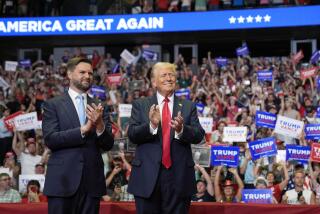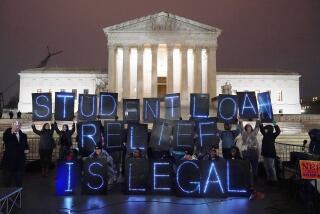Hong Kong Autonomy Curbed by Beijing Rule
Now, Hong Kong knows where it stands.
Thursday marks the second anniversary of the historic occasion when China regained sovereignty over this former British territory. Sadly, it has become clear in the last few days that the guarantees of local autonomy China earlier gave Hong Kong are limited.
In 1984, Deng Xiaoping, the Chinese leader who worked out the deal with Britain for Hong Kong’s future, came up with the famous formula: “One country, two systems.” Hong Kong would be able to preserve its capitalist economy, its freedom of speech and its own legal system.
But in recent days, China and the leaders it has appointed in Hong Kong have come up with a chilling new qualification. As one official in Beijing revealingly analyzed it, “one country” comes first, and “two systems” is of secondary importance.
Last Saturday, China’s legislature overruled a decision by Hong Kong’s highest court. It said bluntly that the court decision was wrong and that the Hong Kong judiciary should have consulted with the Chinese government before issuing its ruling. The upshot is that China, not the Hong Kong judiciary, will be the ultimate interpreter of the laws governing Hong Kong.
The test of the judiciary’s independence came in an immigration case that raised the question of who is entitled to live in Hong Kong. The Court of Final Appeal here decided that under existing laws, any child with one parent who lives in Hong Kong is entitled to reside here.
Chief Executive Tung Chee-hwa, the former businessman whom China selected to run Hong Kong’s government, didn’t like the court decision. Using questionable statistical techniques, Tung’s government estimated that the ruling could grant new residence rights to as many as 1.6 million children, most of them now living in China.
Tung asked China to overturn the court decision. That is precisely what happened.
The Standing Committee of China’s National People’s Congress, China’s legislature, “reinterpreted” the law. It said the right of residence here applies only to those whose parents were both residents of Hong Kong at the time the child was born--including about 200,000 children now living inside China, by official estimates.
The vote by China’s legislature provided a reminder of the monolithic nature of political power in Beijing. It was unanimous: 139 to 0, with one reported abstention by a member who didn’t press the button to vote.
Afterward, Tung warned Hong Kong residents not to “mislead international opinion” by claiming that the rule of law had been undermined. Yet he also pointedly refused to promise that he would not go to Beijing in the future to seek other reinterpretations of whatever the Hong Kong courts decide.
In short, the independence of the Hong Kong judiciary has just been eviscerated. And a series of other recent actions has illustrated the extent to which Hong Kong has become much more a part of China than a semi-autonomous entity.
Two years ago, the Chinese government said the U.S. Navy could continue to make port calls in Hong Kong. But in the wake of the bombing of the Chinese embassy in Belgrade, Beijing has barred America’s warships and military planes from Hong Kong.
So, too, China has decided to let North Korea open up a consulate in Hong Kong, despite evidence that North Korea has used its mission in nearby Macao for arms deals, smuggling and other nondiplomatic ventures.
The deal that returned Hong Kong to China gives Beijing authority over foreign-policy and defense issues here. But unfortunately, this mandate seems to be gradually extending into the very fiber of Hong Kong’s day-to-day politics.
Christine Loh, a member of Hong Kong’s Legislative Council, says that when she takes a position different from the one China advocates, she is sometimes asked, “Are you patriotic or not?”
Hong Kong preserves its political freedoms, so long as it exercises them in ways that do not threaten China.
About 70,000 people gathered in Hong Kong earlier this month to commemorate the 10th anniversary of the Tiananmen Square crackdown. Democracy advocates such as Martin Lee remain outspoken, and the press still enjoys the right to criticize the government.
But these liberties are circumscribed. Chinese dissidents living abroad were prevented from coming to Hong Kong for the June 4 demonstrations. Hong Kong legislators who tried to fly to Beijing to discuss the recent immigration case were barred from getting onto the plane.
Overall, Hong Kong seems to be losing some of its vibrancy, not just in politics but in the economic realm, too. South Korea and Thailand are bouncing back from the Asian financial crisis much more quickly. Hong Kong faces many long-term competitive problems: high wages for employers, high prices for tourists, high costs and rents for consumers.
For years, Hong Kong was the most dynamic city in Asia. Now, it seems to be slowly drifting into a more modest, subdued future in which it will become merely the most dynamic city in the Cantonese-speaking part of China.
*
Jim Mann’s column appears in this space every Wednesday.
More to Read
Sign up for Essential California
The most important California stories and recommendations in your inbox every morning.
You may occasionally receive promotional content from the Los Angeles Times.






